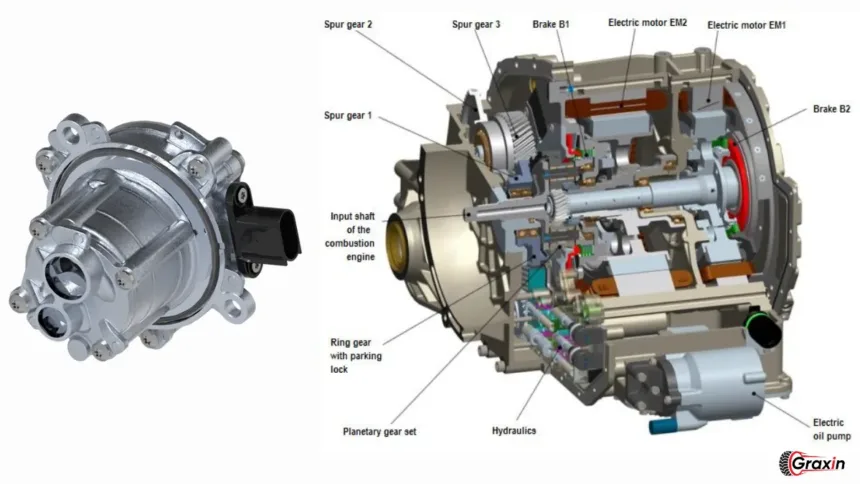Advances in technology have raised demand for vehicle parts that are performance-oriented, fuel-efficient, and long-lasting. Among these high-critical parts is the electric oil pump. Though olden days had seen such mechanical oil pumps driven by the power of the engine, innovation in this regard had seen the electric oil pump prove popular due to its efficiency and precision in the control of oil flow.
What is an Electric Oil Pump in the Automotive Industry?
Overview of Electric Oil Pump for Vehicles
The electric oil pump is one of the components used in a car engine and transmission system for circulating all parts to lube up all moving bodies. The electric oil pump does its independent work unlike mechanical pumps, which function on the engine’s RPM, thus they end up having consistent and precise lubrication at any speed of the engine.
Importance of Oil Circulation in Modern Engines
Oil is the lifeblood of any engine, basically lubricating parts, reducing friction, and removing heat away from the engine. For modern engines-high-performance engines and turbocharged engines in particular-efficient and continuous oil circulation, electric oil pumps ensure that oil reaches where it is needed when it is needed, thus generally improving the performance of the engine and elongating its working period.
How Electric Oil Pump Work in Vehicles
The Mechanism of Electric Oil Pump in Cars
They are chugged through the electric system of the vehicle and the working is controlled using computer programmes of the engine. It begins to lubricate oil round every crucial part in the car like crankshaft, camshafts, and pistons once it has been started. So, at low speed or idle conditions, the engine remains aptly lubricated.
Key Components in Automotive Electric Oil Pump
- Pump Motor: Powers the movement of oil.
- Oil Inlet and Outlet: Directs oil flow in and out of the pump.
- Sensors: Monitors oil pressure and temperature to ensure optimal performance.
- Control Module: Regulates oil flow based on engine demands.
Electric vs Mechanical Oil Pump in Cars
Electric oil pumps are self-contained, of course; that is, they require no RPM from the engine; hence the steadiness of the oil pressure is independent of your vehicle’s speed. This leads to better fuel efficiency and less wear on your engine, especially at times of heavy traffic.
Benefits of Electric Oil Pump in Automobiles
Improved Engine Efficiency
Electric oil pumps provide more accurate and efficient oil circulation compared to mechanical pumps. Since they are not tied to the engine’s speed, they deliver the exact amount of oil required at any given moment, optimizing engine performance.
Reduced Fuel Consumption
As a result, electric oil pumps reduce the load in the engine. Thereby, fuel consumption is reduced, while mechanical pumps consume significantly more power, especially when working at higher RPM to run off the engine. Electric oil pumps only consume power when necessary, thus saving overall fuel.
Extended Engine Life
Consistent and accurate oil flow means there is less friction with parts of the engine. They reduce overheating or part failure due to electric oil pumps providing the exact amount needed for lubrication at all times, thereby hugely extending an engine’s life expectancy.
Types of Electric Oil Pump Used in Cars
Fixed-Flow Electric Oil Pump
These pumps provide a constant flow of oil, ideal for vehicles that do not require varying oil pressure under different conditions.
Variable-Flow Electric Oil Pump
Variable-flow pumps adjust the oil flow rate depending on engine load and operating conditions, offering greater efficiency and adaptability for different driving scenarios.
High-Pressure Electric Oil Pump
Designed for high-performance or turbocharged engines, these pumps ensure that even under extreme conditions, there is sufficient oil pressure to protect the engine.
Common Applications of Electric Oil Pumps in Vehicles
Cooling and Lubrication Systems
Electric oil pumps play a significant role in keeping an engine cool by circulating oil through critical areas, absorbing heat, and preventing overheating.
Turbochargers
Turbocharged engines, in particular, benefit from electric oil pumps as they require precise and continuous oil flow to function efficiently.
Hybrid and Electric Vehicles
For such vehicles, which inevitably use nonconventional oil-circulation systems, electric oil pumps feature as a critical component in hybrid and electric vehicle design. Electric oil pumps in those vehicles control the cooling and lubrication of the electric powertrain.
How to Choose the Right Electric Oil Pump for Your Vehicle
Vehicle Type and Engine Requirements
The type of electric oil pump you choose should match your vehicle’s engine specifications. High-performance engines may require high-pressure pumps, while regular passenger vehicles may only need fixed-flow pumps.
Compatibility with Power Systems
Ensure that the electric oil pump you select is compatible with your vehicle’s electrical system. The pump must work efficiently within the vehicle’s voltage and current limits.
Installation and Maintenance of Electric Oil Pumps in Cars
Installation Tips for Automotive Electric Oil Pumps
Installing an electric oil pump requires precision and attention to detail. Make sure the pump is properly connected to the vehicle’s electrical system and positioned to allow optimal oil flow.
Maintenance and Care Guidelines
Regular maintenance is key to ensuring the longevity of your electric oil pump. Check the pump and sensors regularly, and ensure that oil levels and quality are maintained to avoid clogging or overheating.
Conclusion
An electric oil pump improves efficiency for an engine, decreases fuel consumption, and increases the life of the engine. No matter whether a person drives a performance vehicle, a hybrid, or just something quite standard, an electric oil pump has the potential to make improvements in the overall performance and dependability of a car.
.
FAQs
- What are the main benefits of using an electric oil pump in a car? Electric oil pumps offer improved fuel efficiency, precise oil control, and extended engine life compared to traditional mechanical pumps.
- Can electric oil pumps be used in all types of vehicles? Yes, electric oil pumps can be used in a variety of vehicles, including passenger cars, trucks, and hybrid or electric vehicles.
- How often should I maintain my car’s electric oil pump? Regular maintenance should be done every 10,000-15,000 miles, or as recommended by the manufacturer.
- Are electric oil pumps more energy-efficient than mechanical pumps? Yes, since electric oil pumps only use power when necessary, they consume less energy than mechanical oil pumps.
- Can I install an electric oil pump in an older car? Yes, but you may need to ensure compatibility with the car’s electrical system and engine requirements.
Also Read : Danzi Engine: The Future of High-Performance Engineering







